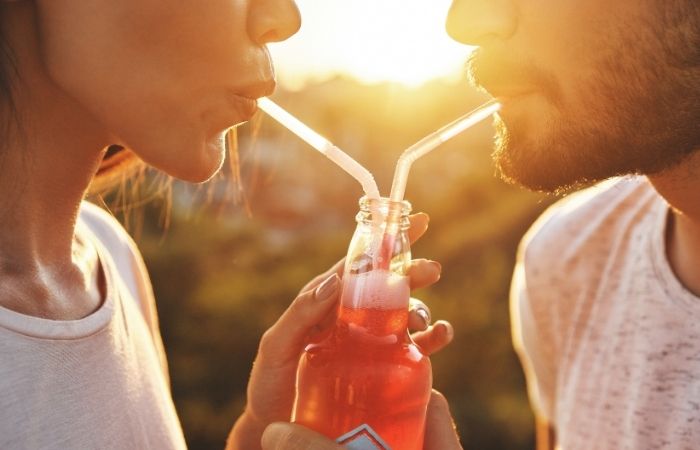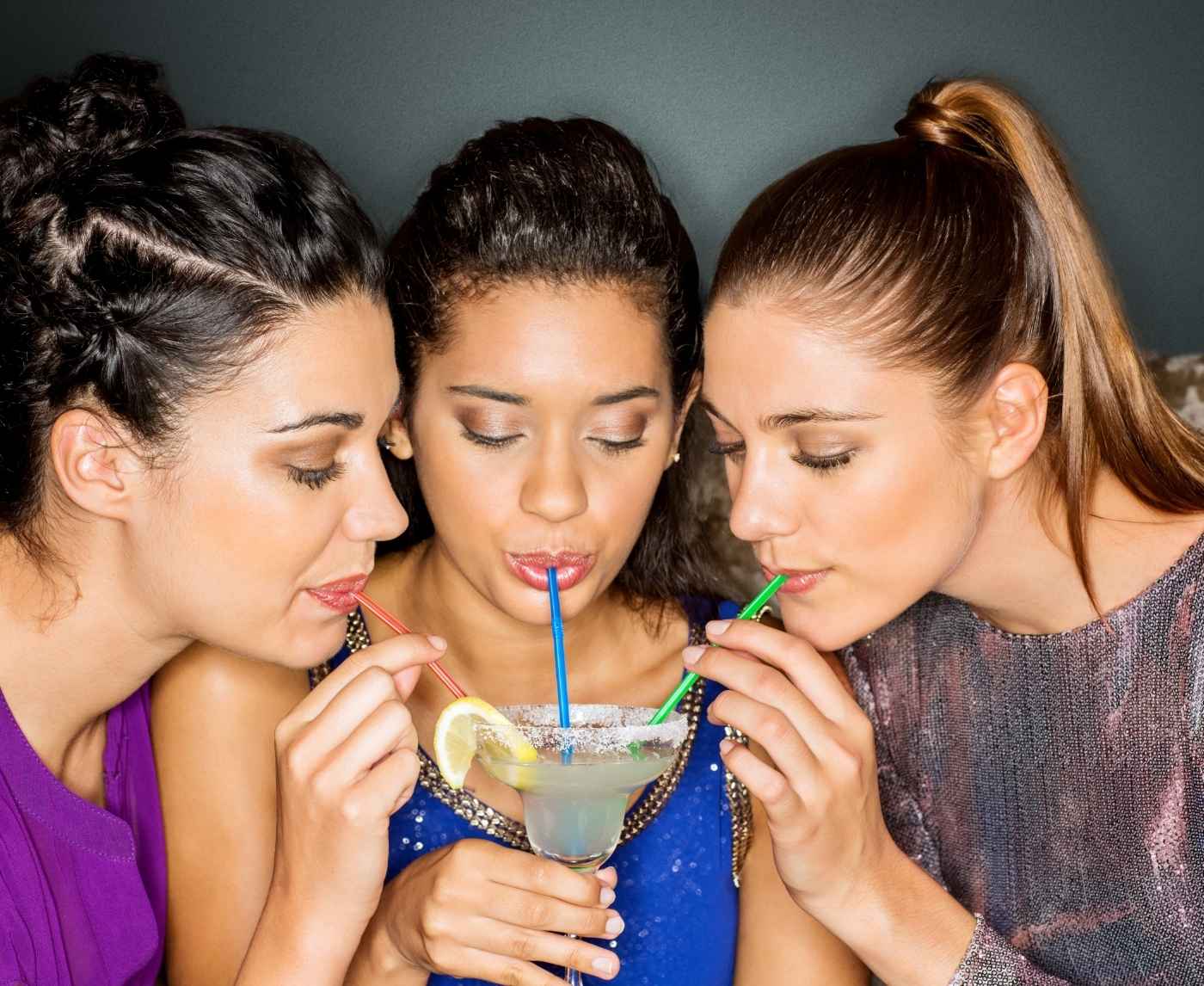Quick Answer: Oral herpes is unlikely to spread through shared drinks or utensils. HSV-1 spreads primarily through direct skin-to-skin contact, especially during an active outbreak or viral shedding. Surface transmission is extremely rare.
What Exactly Is Oral Herpes?
Oral herpes is caused by the herpes simplex virus type 1 (HSV-1). It typically shows up as cold sores, small, painful blisters that appear on or around the lips. Once you’re infected, the virus stays in your body forever, often flaring up when triggered by stress, illness, sun exposure, or hormonal changes.
HSV-1 is incredibly common. According to the World Health Organization, around 3.7 billion people under age 50 have the virus globally. That’s over half the world.
Most people get oral herpes during childhood, from kissing relatives, sharing food, or just being alive in close quarters. But just because it’s common doesn’t mean it’s not confusing. Especially when it comes to how it spreads.

People are also reading: STD After Infidelity? Here’s What Happens Next
Herpes Doesn’t Live Long on Cups, Straws, or Forks
Let’s get scientific for a second. HSV-1 is a fragile virus. It needs moisture, warmth, and live skin cells to survive. Once outside the body, like on a dry plastic cup or a metal spoon, it dies quickly. Studies show it loses its ability to infect within minutes, especially in dry environments.
One study published in the Journal of Infectious Diseases found that HSV-1 is highly susceptible to drying and doesn’t remain viable on surfaces for long. In other words: by the time you pick up that water bottle, the virus (if any) is almost certainly dead.
That means the risk of getting herpes from a shared drink is close to zero. Here's why:
- No live skin cells: Herpes needs mucosal contact or an active sore to spread
- Virus degrades quickly: Herpes can’t “swim” in leftover soda or cling to a dry straw
- Transmission requires direct contact: Like kissing, oral sex, or open sore-to-skin exposure
If someone drank from your cup, the virus would have to survive on that surface, stay infectious, and enter your body through a break in the skin or mucosa. That’s a long shot, even during an outbreak.
Okay, But What If They Had a Cold Sore?
Still nervous? Totally fair. Let’s say someone with an active cold sore sipped your drink. Does that change the game?
Technically, yes, but only slightly. During an outbreak, herpes is more contagious. There's more viral shedding, and active sores contain fluid filled with infectious particles. But even then, surface transmission is highly inefficient. Unless you put your mouth on the exact same wet spot within seconds of their use, your risk is still very low.
According to the CDC, HSV-1 is spread primarily by kissing or oral-genital contact, not casual sharing of cups or utensils. That’s why herpes is considered a skin-to-skin STD, not a fluid-borne one like HIV.
If you’re feeling anxiety, that’s valid. But the science is solid: you’re not likely to get herpes from a drink, cold sore or not.
Cold Sore Recurrence: What Triggers It (and What Doesn’t)
If you've had oral herpes once, chances are you'll get it again. HSV-1 lives in nerve pathways and can "wake up" when triggered by things like:
- Stress or illness (especially colds or fevers)
- Sun exposure (UV light is a major flare-up culprit)
- Hormonal changes, like periods or pregnancy
- Weakened immune system
But here's what doesn't usually cause a flare: sharing food, drinks, or utensils after the sore has healed. While herpes is highly contagious during outbreaks (when sores are visible), the virus sheds far less when dormant. Still, it’s possible to spread herpes through asymptomatic shedding, which is why being aware and honest with partners, even during cold sore-free periods, matters.
So no, your latte probably didn’t give you herpes, but if your friend had a crusty sore on their lip and took the first sip? Then yes, there’s a real, though low, risk. When in doubt, wait until the sore is fully healed before sharing anything that touches the mouth.
Viral Shedding: The Reason Herpes Can Spread Without a Sore
This is where it gets a little tricky, and why the fear of sharing drinks exists in the first place. Herpes can be contagious even without a visible sore. This is called asymptomatic viral shedding, and it happens when the virus is active on the skin without causing symptoms.
During these periods, a person can transmit HSV-1 through kissing or close oral contact without ever knowing they’re infectious. That’s one reason herpes spreads so widely: people don’t even realize they have it.
But here’s the thing: even during viral shedding, the virus still requires skin-to-skin or mucous membrane contact to spread effectively. That’s why herpes doesn’t jump from saliva residue on a cup to your lips. It doesn’t teleport. It needs friction, fluid, and a pathway into the body.
Put another way: herpes doesn’t hitchhike on Starbucks lids. It needs your lips.
Check Your STD Status in Minutes
Test at Home with RemediumOral Herpes Test Kit

 For Men & Women
For Men & Women Results in Minutes
Results in Minutes No Lab Needed
No Lab Needed Private & Discreet
Private & DiscreetOrder Now $33.99 $49.00
So Why Does Everyone Think Drinks Can Spread It?
Two reasons: misinformation and shame.
For decades, herpes was treated like a dirty secret, an STD for the reckless or promiscuous. Combine that with early sex-ed that used scare tactics (think: "never share lip balm or you’ll catch herpes!") and you’ve got a recipe for widespread confusion.
Even Google doesn’t help sometimes. Search results often mix casual user stories, outdated health posts, and clinical papers that don’t explain transmission clearly. The result? Thousands of people every month search things like:
- “Can I get herpes from a water bottle?”
- “Is it safe to kiss someone who drank from my cup?”
- “Herpes from a shared joint or vape?”
The short answer to all of these: In theory? Almost never. In reality? Highly unlikely.
If you want 100% certainty about your own status, the most helpful thing isn’t avoiding drinks, it’s getting tested.
You can use an at-home oral herpes test to check for HSV-1 or HSV-2. It's fast, discreet, and doesn’t require any awkward conversations.
Real Talk: “I Got Herpes From a Kiss at a Party”
Avery, 21, was a college student who had never had sex. She kissed someone at a party, woke up a few days later with a tingling sensation near her lip, and assumed it was nothing.
“It started like a weird itch, and then a tiny blister popped up. I googled it and went into full panic. I thought herpes was something you got from sex, not kissing. I was mortified.”
She tested positive for HSV-1. The person she kissed? Never had a visible sore, and had no idea they were a carrier.
This is how most people get herpes: not from drinks, not from bathrooms, not from razors, but from kisses. The kind you don’t think twice about.
Avery's story is one of millions. She’s not reckless. She’s not dirty. She’s just a human being who had a very normal experience, and got a very stigmatized virus.
What If I Already Shared a Drink? Should I Panic?
Nope. Don’t panic. The odds of catching herpes from a shared drink, even from someone with an active cold sore, are extremely low. If you don’t have a cut, sore, or broken skin near your mouth, your risk is almost nonexistent.
Here’s what to do instead of spiraling:
- Don’t scrub your lips or over-clean: You can’t “wash off” herpes post-exposure, and harsh cleaning can cause irritation.
- Don’t jump to conclusions: A tingle or bump doesn't automatically mean herpes, pimples, irritation, or chapped skin are all common.
- Wait and monitor: If nothing develops within 2–20 days, you’re likely fine. That's the incubation range for a first HSV infection.
- Test if you're anxious: A herpes home test can give you peace of mind.
Most people who think they caught herpes from a cup are actually dealing with anxiety, not exposure. That doesn’t mean your fear isn’t valid. But it does mean you don’t need to let it spiral.
Worried? Test. Not worried? Move on. Your body will let you know if something’s up, and even then, herpes is treatable, manageable, and more normal than people realize.

People are also reading: The STD That Pretends to Be a Mosquito Bite: How to Spot Syphilis Sores
Other Myths About Catching Herpes
If you’re nervous about sharing drinks, you’ve probably also heard some of these:
- You can get herpes from a toilet seat. False. Herpes doesn’t live long on hard surfaces and doesn’t enter through the butt or thighs.
- You can get herpes from towels or razors. Extremely unlikely. Dry surfaces and lack of mucosal contact make this nearly impossible.
- You can get herpes from sharing lip balm or lipstick. Theoretically possible during an active outbreak, but again, rare and requires immediate back-to-back contact.
- Herpes is only contagious during outbreaks. False. Asymptomatic shedding is real, which is why many people transmit the virus without knowing.
Most of these myths come from outdated sex ed, stigma, or plain misinformation. The truth? Herpes spreads through people, not objects. Through skin, not straws. Through kissing, not cups.
How to Protect Yourself (Without Becoming Paranoid)
Let’s be clear: you don’t need to Lysol every surface or fear your friends. But if you want to reduce your risk of catching or spreading oral herpes, here are some simple, non-paranoid tips:
- Don’t kiss during outbreaks: Cold sores = high contagion
- Skip drink sharing if someone has a visible sore: Just to be extra safe
- Use your own lip balm and utensils: Especially during flu season or if someone’s visibly sick
- Get tested if you're unsure: Knowing your HSV-1 status helps reduce anxiety and makes informed decisions easier
You don’t have to avoid everyone who’s had a cold sore. You just need to stay informed, stay compassionate, and remember that herpes is more common than not.
Still Nervous? Let’s Talk About That “What If” Feeling
Even with all the facts, it’s normal to walk away from Google feeling uneasy. Maybe you shared a drink yesterday and now your lip feels tingly. Maybe your ex had cold sores and you're replaying every sip you ever shared. That fear is valid, and common.
The truth is, oral herpes (HSV-1) is everywhere. Most people get it in childhood. Others pick it up through dating, kissing, or yes, sharing the occasional drink when someone’s shedding virus.
But here’s the key: worrying after one sip won’t help, but testing, awareness, and honest conversations will. Herpes isn’t the end of your sex life, your confidence, or your worth. It’s just something to manage, like a cold or a flare-up of acne. The more you know, the less power it has over your mind, or your peace.
Check Your STD Status in Minutes
Test at Home with Remedium7-in-1 STD Test Kit

 For Men & Women
For Men & Women Results in Minutes
Results in Minutes No Lab Needed
No Lab Needed Private & Discreet
Private & DiscreetOrder Now $129.00 $343.00
For all 7 tests
FAQs
1. Can I get an STD test without telling my family?
Yes. If you are 18 or older, you can legally get private STD testing. Many states have laws that let minors give consent for sexual health services, even if they are under 18.
2. What if my parents get the bill for the insurance?
After services, insurance may send you an Explanation of Benefits (EOB). If privacy is very important, use at-home kits or free clinics that don't bill insurance.
3. What should I say to my abuela about getting tested for STDs?
Pick a calm time, be careful, and talk about health, not guilt. You can say you're doing it to be safe and responsible, not because something is wrong.
4. Will people judge me for getting tested?
Maybe, but that judgment is based on stigma, not truth. Testing is not careless; it is responsible. You're on the right track.
5. Is it possible for me to test at home without anyone knowing?
Yes. STD kits that you can use at home are discreet, accurate, and come in plain packaging. You don't have to go to the clinic.
6. What should I do if my family gets mad?
Stay calm and tell them that you are acting out of love and maturity. It's okay for them to feel the way they do, but your health comes first.
7. Is it rude to talk about sex in front of older people?
It all depends on the situation. But your safety is more important than old rules. You can be direct and polite at the same time.
8. What STDs should I get tested for?
Chlamydia, gonorrhea, syphilis, herpes, HIV, and HPV are the most common. A combo test tests for more than one thing at once.
9. Is it possible for me to get tested even if I don't have any symptoms?
Yes, and you should. A lot of STDs don't show any symptoms. The only way to be sure is to get tested regularly.
10. How often should I get tested?
Get tested every three to six months, or after having sex with a new partner, having sex without protection, or being at risk of exposure.
You Don’t Need to Fear the Cup, Just Know the Facts
If you’ve been anxious about catching herpes from a drink, you’re not alone. But the science is clear: oral herpes doesn’t spread easily through surfaces. It’s passed through kisses, not cups. Skin, not spoons.
If you're still worried or just want to know your status, there’s no shame in getting tested. You deserve clarity. And the truth is, most of us are navigating herpes without even knowing it.
Sources
1. CDC – Herpes Simplex Virus Facts
2. World Health Organization – HSV-1 Overview
3. NIH – Herpes Simplex Virus Transmission Studies










